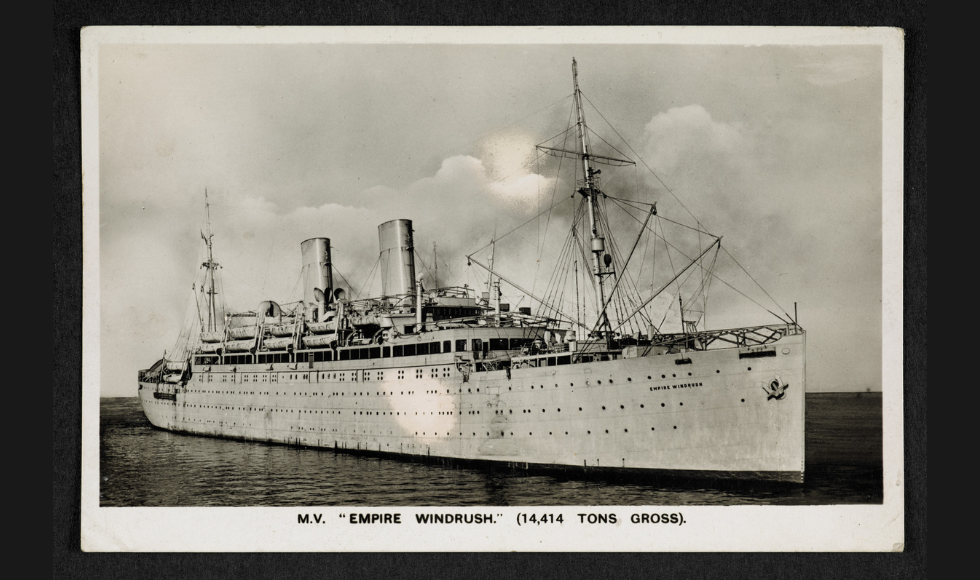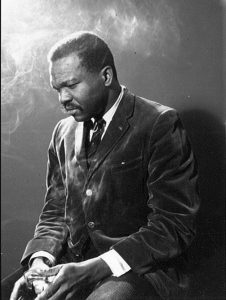Windrush course explores the creation and legacy of diaspora

A postcard purchased onboard the Windrush by Winston Levy, who kept it as a souvenir of his journey. His notes on the back record that the ship "sailed from Kingston, 6 A.M. 27/5/48". (By kind permission of Andrea Levy, via the British Library)
BY Sara Laux, Faculty of Humanities
June 23, 2023
This week, the U.K marked the 75th anniversary of a significant chapter in the history of the Caribbean diaspora: the 1948 docking of the SS Empire Windrush at Tilbury Docks in Essex.
The ship, which left Jamaica on May 24, carried 1,027 passengers (and two stowaways). More than 800 of those aboard had left countries in the Caribbean for new opportunities in the United Kingdom in the aftermath of World War II, encouraged by the British Nationality Act of 1948 that granted citizenship and right of abode to all people within the British Empire.
Windrush has since become the defining symbol of a generation of Caribbean immigrants to the U.K. who faced racism, lack of professional mobility and, much later, threats of deportation — but who also changed the face of English and Caribbean history, economics, art and culture.

Ronald Cummings, an English & Cultural Studies professor whose research focuses on Caribbean literature and Black diaspora studies, launched a new course this year to teach his students more about the literature and other creative forms that grew out of the Windrush Generation.
Cummings used the significant archival collections in the McMaster Library’s William Ready Division of Archives and Research Collections to supplement the class’s reading and discussion.
His course, called “Windrush Writing/ Writing Windrush: Empire, Race and Decolonization,” looks at the work of Caribbean-English writers who were part of the original Windrush Generation, as well as those from subsequent generations influenced by that legacy of Caribbean migration in the mid-twentieth century.
Across the genres of novel and poetry, the course explores the multiple ways in which writers have attended to the narratives, history and politics of diaspora making.
“These authors are united by the experience of migration and they explore and write about that experience in their work — and, of course, linked to that are questions around cultural encounters, particularly encounters with Britain in relation to the histories of colonialism in the Caribbean,” Cummings explains.
“There’s a process of encountering the ‘Motherland’ or the colonial metropole in all its complexities, and then also an experience of engaging in their own modes of narrative making and literary decolonization.
“As critics and students who study Caribbean literature and literatures in English, we can begin to see conversations across different texts about the ways in which people were responding to a set of historical circumstances.”
Cummings is also introducing his students to important literary and historical archives, both at McMaster and in the British National Library, to place the Windrush writers and their legacy within their bigger historical context — one that was a significant period in the history of decolonization, as many places in the world, including many of the islands in the Caribbean, became independent of former colonial powers.
“I want students to have both an understanding of the kinds of individual experiences that are being narrated in these texts, but also a wider sense of the historical period to understand that these movements, these migrations, these particular experiences, are shaped by a larger context of colonialism and decolonization,” he says.
“Often, when we talk about decolonization, we frame it as a goal that’s something to be achieved, but we forget that it also has a history. The political moment which followed Windrush, and is part of that history, was the moment of spaces like Jamaica and Barbados and Guyana gaining independence from Britain — and it’s important to return to that moment, in order to appreciate the ways in which this is a long and ongoing struggle.”

Working with and guided by Myron Groover, McMaster’s archives and rare books librarian, Cummings’ students have explored, among other things, the archives of Austin Clarke, the acclaimed Barbadian Canadian writer whose works include the Giller Prize-winning novel The Polished Hoe and More, and the memoir ’Membering.
The archive, which comprises almost 200 boxes of material, is a comprehensive collection of Clarke’s thought, scholarly output and correspondence, including — most interestingly for Cummings and his students — Trinidadian author Sam Selvon and Jamaican author Andrew Salkey, both of whom immigrated to England as part of the Windrush generation.
Along with their writing, Clarke and Salkey in particular discussed issues of belonging, identity, displacement, and their experiences of being Black men in different urban diaspora environments. These questions, all explored in their letters, are themes that resonate in one way or another with Cummings’ students, regardless of whether or not they have direct family connections to the Windrush history.
“Dr. Cummings sees the potential for student learning in these archives, for students seeing themselves and their experiences reflected there, and teaching with archival sources is something we really value and cultivate at the Library — so he and I have worked together to design teaching partnerships and invite students to engage directly with the materials during class time,” explains Groover.
“I think it’s really important for students to see themselves reflected in these collections, and to have a sense of themselves as owners of the material. These collections are the common cultural property of humankind, after all, and we hold them in trust for humankind. So students are participants in, and collective owners of, these experiences.”


